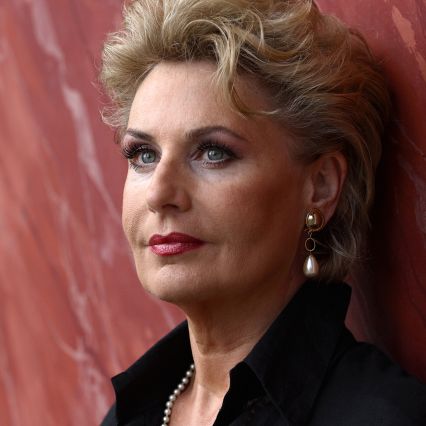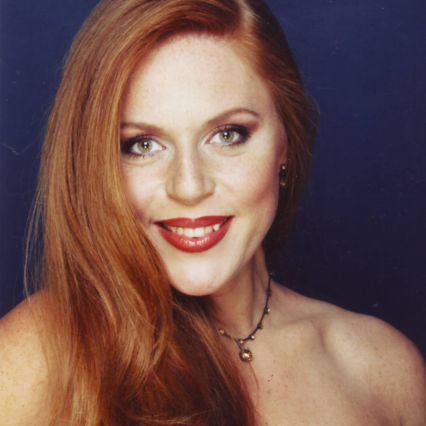„La fiamma“ wirft drei Frauen in einen brutalen Konflikt voller Intrigen, Verrat und Denunziation - Deutsche Oper Berlin
“La Fiamma” engulfs three women in a brutal conflict full of denunciation, treason and plot
And that means: three great singers engage in a musical exchange of blows. Two interpreters - Doris Soffel and Martina Serafin - talk about how they find their way into their roles

Ms Soffel, what are your thoughts on LA FIAMMA, seeing as it’s hardly ever staged?
At last, back to singing in Italian. As a Wagner and Strauss specialist, that’s kind of special for me. The main thing, though, is that all three of us will be tackling the work almost like we would a world premiere, so there’ll be a sort of pioneering atmosphere. That’s always smashing and gets the creative juices flowing!
Respighi is considered to be one of the key figures in Italian instrumental music. But is Agnese, the role you’re playing, even the slightest bit Italian in terms of voice fach?
So, yes, the music has so many different strands that it’s hard to call it typically Italian anymore. There are hints of Puccini and verismo, Wagner too, and then at the end of Act 1 it’s almost like you’re in the middle of a Passion. I mean, Act 1 is really in your face dramatically. And then the singing roles go from hysteria in extremis to classical Italian harmoniousness.
Agnese is accused of infanticide and condemned as a witch. Everything happens really fast. How do you manage to get into the tragic character?
We’re thrown into the action halfway through and don’t get much heads-up on what’s gone before. My first words in the opera are in a desperate whisper: »Silvana! Save me!« The kind of tone you use with someone you know very well. Silvana’s mother, who’s also suspected of being a witch, was my friend, which explains why I’m going to her daughter for help. Me and Silvana are linked by that dark and tragic secret. That’s how I get into the role.
Witch trials are not a thing nowadays, luckily. So what can witches still teach us?
Witches were outsiders. I don’t think they were very into religion. And they were misfits in other ways, too, if you ask me. You still get this kind of person, obviously, but they have other labels. The way a society treats its »outsiders« reveals a lot about that society. And it’s not as if modern society has got rid of things like mass hysteria, mob justice and public pillorying. Just look at social media!
What aspect of the role poses the biggest challenge?
The part is incredibly intense. There’s no let-up for me – in the singing or the acting; every single note means something. But the real challenge is getting her powerlessness right. I surrender on stage to a violent mob, a hounded old woman staring ordeal by fire in the face. It’s different for everyone, of course, but it’ll hardly surprise you if I say I’m affected by it.

Ms Serafin, what was your first thought when they offered you the part of Eudossia?
First of all I had to look the opera up on the internet and listen to it. But at the first hearing I knew at once that I had to sing the part! Musically I got a buzz from the halfway-house voice type: deeper than a soprano, but not a classical mezzo-soprano. Eudossia’s voice is medium-pitched but sometimes hits lovely peaks. It makes for a very special blend.
Action-wise, she doesn’t glow with virtue, considering she kicks off a witch trial against her own stepdaughter…
It might sound cynical, but she has her reasons. She catches her stepdaughter in the act with her grandson and is later witness to her son falling down dead after an argument with his wife. From that point on, Eudossia’s actions are primarily those of a mother looking to ascertain why her son died and wanting revenge. She is a child of her period and back then people believed in witchcraft. There were official trials in courts of law, with witnesses heard and so forth.
Do you find it easier to play her if you focus on the loving mother within the evil stepmother?
That’s my first slant on her, the one that comes most naturally. I’ll keep any other angles open for the rehearsals. In December with Christof Loy I worked on my debut as Ortrud in LOHENGRINs, after spending 20 years singing the part of Elsa. It was an amazing experience. He was a huge help to me as I was getting into the role. And it’ll be the same with Eudossia, too.
What is it about a witch that still fascinates us in the present day?
She represents evil and otherness and prohibition. We’ve always been enthralled by that stuff. There’s the fear of the inexplicable, the supernatural, and maybe a part of us that wonders what it would be like to wield a sorcerer’s powers.
Interviews: Tilman Mühlenberg




